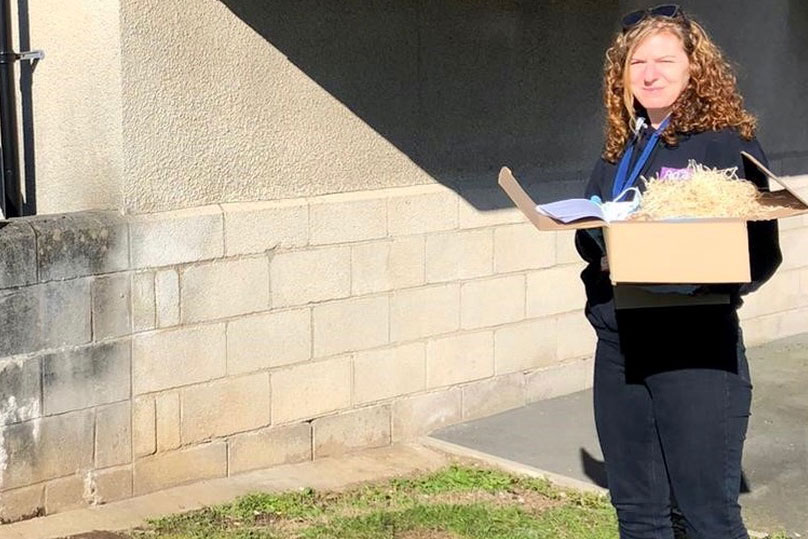
Kathleen Hughes is one of our Officers who offers support to our tenants. She might be a familiar face to many of you in the Bangor area where she is based. But we’d like to bring her job to life to other who don’t know her.
Her neighbourhood services job is split into two roles, working three days a week as a Supported Housing Officer, covering tenants and sheltered sites, and two days as a Tenancy Support Officer, where she supports vulnerable people to stay in their homes.
So let’s go on a journey with Kath to look at a typical working week for her…
Monday
I visit my tenants in our supported schemes between one and three times per week.
These visits or calls are to check all is well with them, supporting them to reduce possible feelings of loneliness and isolation, and if they have no family support to check if they need any housing related help.
This could be advice on what to do with
- letters
- developing payment plans for bills and supporting them to access benefits online.
- get adaptions to their homes or refer them to our occupational therapist for an assessment of their needs.
I work with many other agencies in my role.
I build relationships with our tenants, providing help, support and reassurance to them and their families, which I find a really rewarding aspect of my job. Hearing customers say how my support has genuinely helped them, when sometimes they didn’t know which way to turn, gives me the best feeling.
Tuesday
On Tuesdays and Thursdays, I try to focus on tenancy support, getting help for residents with learning difficulties or issues with substance misuse, gaining access to food vouchers, providing support to improve the condition of their home or helping them to move.
I help tenants to:
- set up or maintain new tenancies
- receive referrals from mental health or social services and gain referrals to GPs or healthcare settings
- gain access to assisted funds, to purchase white goods, for example, or to set up utilities.
I speak with on average 30 or 40 people per week, checking in with them. It’s about developing a relationship with the tenants and over the past three years at Adra I’ve built up trust. Sometimes tenants have a chaotic lifestyle and I can work with up to seven different agencies working to support one resident, so you have to have strong interpersonal skills.
I’m always striving to keep tenants and their families in their home which, due to drug or alcohol addiction, they may have thought was beyond their reach. It’s about giving the tenants the tools to gain positive outcomes by doing things themselves, as opposed to doing everything for them, as they need to run their own lives and their tenancies and develop their independence.
Wednesday
If I’m concerned about a tenant and their welfare, I have the option to refer them to social services, to gain support for mental health issues, or to Citizens Advice for help with benefit claims.
Every day is different – some are quieter than others – and there is never a strict routine as you never know how long a visit or call with each tenant will take. You never know when a tenant is going to call or message you with an issue and request for help.
For each role, I have weekly virtual team meetings, where we get together and discuss any issues.
Thursday
The tenancy support role can in many ways be similar to the supported housing role in that I work with a lot of the same agencies, such as the Jobcentre or social services, but with tenancy support the level of support is more intense and short term. This is due to a maximum of two years’ funding, although to support a tenant for more than a year is rare.
I will contact these tenants a minimum of once a week and we will go through what issues they have and how we can help. Each tenancy support tenant will receive intense help for a few hours a week initially, which reduces over time. Supported housing tenants can receive up to 45 minutes of support per week, which can be three shorter visits or calls or one longer one.
As well as my contact with the tenants, I have the usual paperwork that goes with it; the end of the week can be a good time to catch up and input this data, although it is a continual work in progress. Each tenant for both supported housing and tenancy support has individual support plans which are reviewed every six months. My role is funded by the Housing Support Grant in Wales and we submit scores to the Welsh government.
We do an initial assessment where they are scored on various aspects of living and what help and support is required. We then set out what we want to achieve, what help is required and where this can be received.
Supported housing and tenancy support is about making customers independent, feeling safe, managing their accommodation and supporting their physical and mental health.
And that’s the end of a typical week with Kathleen. What a busy week!
We hope that this has given you an idea of the type of work she does and how so many people benefit from her help.
Thanks for all your hard work Kath!